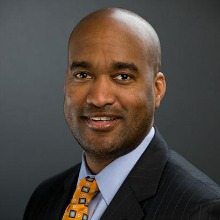
Once upon a time consumers of healthcare information did not have direct control over when or how they accessed content. They received and digested that which was force-fed to them.
Then came the new media age. And then came mobility, and, shortly thereafter, the age of the empowered and entitled consumer. Or at least that’s the story Chris Foster tells.
The Booz Allen Hamilton (BAH) Vice President graduated from the University of Virginia (UVA) with an undergraduate degree in philosophy and had complete intentions to pursue a law degree, before pivoting 180 degrees to the civil health business.
He sold health and life insurance right out of college and 21 years later, he leads the arena with his broad knowledge of public health, healthcare provider groups, managed care, media relations, alliance development and pharmaceutical marketing.
“In hindsight what it really taught me was to think critically and analytically, and to be incredibly curious and challenge the obvious,” Foster said of his philosophy degree, noting that his post at BAH provides him with exactly the empowering academic and educational exercises he craved while attending UVA. “I really enjoy Booz Allen because we collaborate with our clients to solve their most mission and business-critical problems. That, to me, is as much an academic and educational exercise as it is a business exercise. I feel like I’m still learning and still teaching.”
The Charlottesville-based school is known for its tradition of student self-governance, which empowers its students with decision-making. It was a tradition that fundamentally impacted Foster’s perspective.
“The philosophy around student self-governance at that point in my life was very empowering,” Foster said. “I was very active in student politics at a time in my life when I needed it and it just challenged and stretched my thinking while giving me access and exposure to professors and the administration in ways that you normally don’t get in the classroom.”
He carries that appreciation for empowerment over with him when thinking about mobility, too, and suggested the proliferance of innovative mobile technology in healthcare will impact society and business because it allows retailers, health entities and the federal government alike to act as gatekeepers for the mobile brands with which they wish to interact or engage.
“If we look at this through the lens of mobile technology and think about big brands – today, I have the power, given my relationship with the mobile device, to turn off and on brands and drive how I interact and experience a brand in ways that I didn’t have even three to five years ago,” Foster said.
But the instant gratification environment of mobility also brings with it what Foster dubbed “the impatience dilemma” — the phenomenon whereby the constant and instantaneous access to information has accustomed the consumer to the instant gratification of information.
The setback of the empowerment brought with mobility, Foster said, is that consumers interact most with user generated content, which is often unfiltered.
“There is a lack of control out there from the enterprise wide standpoint that we are only really scratching the surface on,” Foster said. “I think as communication professionals, and even in the media, managing that and recognizing that is changing the relationship you have with your users in a profound way.”
When asked about healthcare reform and the new marketplace, an area where Foster focuses his work at Booz Allen, he commented that he is optimistic about all of the good work that the U.S. Department of Health and Human Services (HHS) and other agencies are doing to support standing up the new marketplace. Communications and engagement with individuals will be critical to the success of their effort. Mobility and emerging trends in mobile should greatly enhance the enrollment, engagement and education efforts.
“I think we can build these exchanges and we can create the new marketplace but if our consumers get confused – if they don’t understand the power of what they can do, and what they should be accessing – then I don’t think the exchanges will reach their full potential,” Foster said. “I think it is important for us to focus on education and engagement from a consumer standpoint.”
And demystifying technology buzz words like ‘cybersecurity’, ‘mobility’ and ‘cloud’ go hand-in-hand with that consumer empowerment, Foster said.
“I do think a phenomenon may occur among consumers and users – this world of technology may feel so big that we don’t pay attention to it, and the technology buzz words feel very technical. I want to work more with professionals in a way that’s more helpful and to show the side of security, privacy, integrity that I think can be more empowering and less frightening.”
He said he hopes to see more user-information interaction. “In interacting with information they are coming to conclusions on their own and that’s going to be transformative across sectors and markets.”


